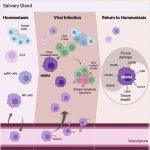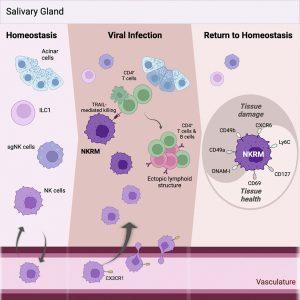In a recent study, scientists revealed a previously unrecognised function of natural killer (NK) immune cells, which have improved our knowledge of how the immune system is controlled to avoid disease (Figure 1).
Tissue-resident memory natural killer (NKRM) cells were discovered by the research team as a novel class of immune cells. When the immune system erroneously targets the body’s own tissues or organs, a condition known as autoimmunity, NKRM cells suppress immune reactions in tissues and stop it. The finding may eventually be used to treat autoimmune illnesses like Sjogren’s Syndrome and perhaps chronic inflammatory conditions, though more study is necessary.
NK cells were initially believed to be transient cells that move in the blood with the primary purpose of locating and swiftly eliminating virally contaminated or damaged cells. This is crucial for maintaining tissue function and halting the onset of autoimmunity. Although long-lived tissue resident memory T cells (TRM) have been identified, the host’s defence against reinfection remains their main role.
Their finding of tissue-resident memory natural killer (NKRM) cells proves that some memory cells living in tissues have a different purpose than protecting against recurrent infections: they protect against excessive inflammation.
Journal article: Schuster, I.S., et al., 2023. Infection induces tissue-resident memory NK cells that safeguard tissue health. Immunity.
Summary by Stefan Botha

